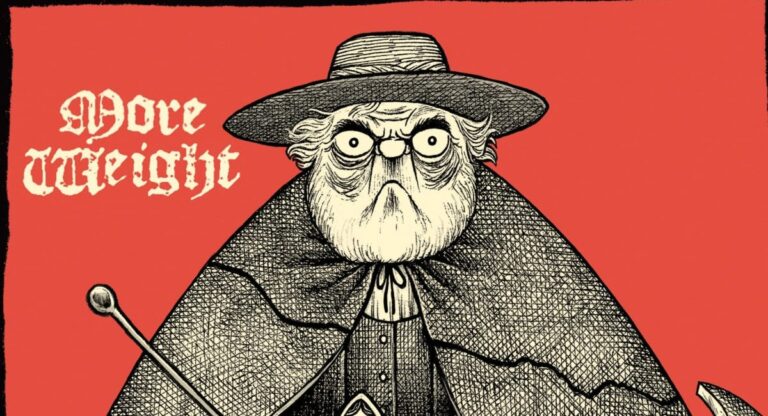More Weight: Salem’s Story
Author: Ben Wicki
Publisher: Top Shelf Productions – IDW Publishing
Release date: September 2025
The memory of the Salem Witch Trials remains permanently entrenched in the American collective psyche, even though it occurred before any ideas of independence began to emerge in the colonies. That explains too much about American attitudes toward truth and paranoia. It never fully heals because it keeps changing shape to stay relevant.
Ben Wicke’s More Weight: A Salem Story is a monumental and thorough attempt to capture the innermost details of this foundational event and how the events it spawned have endured through time and remain one of the key elements of the American experience. Patience here is not something that can ultimately be seen as a positive thing. It shows a kind of possession that refuses to loosen its grip on this country’s history.
More Weight is set in three different centuries. The film focuses on the witch trials of 1692, writers Nathaniel Hawthorne and Henry Wadsworth Longfellow’s reflections on their ties to Salem in the 1860s, and Wicky’s own town’s struggle with its long-nurturing modern-day “City of Witches” identity. Each section gets attention, but it’s the witch trials that get the bigger pie. The reason lies in a real person named Giles Corey.
Corey is an interesting person. He and his wife were accused of witchcraft and suffered the terrible consequences of being accused of such a crime. But what makes him remarkable is how the final part of his story unfolded. He was sentenced to death for three days because he did not enter a plea of guilty or not guilty during his sentencing. During the torture process, each time someone on the judge’s side tried to get Giles to plead guilty or not guilty, Giles responded, “more seriously.” The judge obliged.
When I read Wicki’s book, I can’t help but think of Alan Moore’s From Hell. There’s a sense of “big picture” anxiety as the characters worry about how the witch trials will mark their moment, and how badly it will go wrong in the grand scheme of things.
Where From Hell (a story about the collapse of Victorian England’s sense of order and decency during the murders of Jack the Ripper) dealt with the fabric of history and how the past created a sacred altar to itself, More Wait approaches history as a series of injuries and badly healed scars that seem destined to infect future generations with the same darkness that laid its foundations.
Wicki depicts this with a comic sensibility, and the brutality of the trial is made all the more powerful because of the easy access the character designs give the reader. It’s like a failed comic, but with enough style to stick with it. It’s similar to how illustrator Edward Gorey combined comic books with disturbing subject matter. The effect is ultimately disturbing.
The visuals change in the Hawthorne and Wadsworth Longfellow sections to more realistically portray the characters and locations. This approach shows the unique changes between eras that allow the reader to examine Salem and its history in different records. The same applies to modern times. There, the town is presented in its most tourist-friendly form, in order to frame its heritage as a precarious construction that knows how to hide in plain sight when needed.
Wicky also has a great use of color. These are used intentionally to signal the arrival of more complex and abstract ideas that require different thought processes. More importantly, they help comment on the philosophical distance between historical periods. The further away you are from the trial, the brighter the colors become. However, this should not be used as an indicator that things are changing for the better. Instead, history informs an ability to integrate and survive in the face of new national upheavals. You can see how much story you can pack in with color.
More weight is a win. This book has earned its place as one of the best studies of the Salem Witch Trials in recent years, especially for its ability to bring the past before our eyes. This work deserves to be told in the same breath as Alan Moore’s From Hell, both in terms of scope and narrative complexity. More Weight has acquired the rights to be included in every story in the new comic cannon. It’s not often that such a great classic appears in this medium and immediately becomes basic reading material. Ben Wicki has succeeded in creating just that with this wonderful book.
More weights now available
Read more great reviews of The Beat!
Something like this:
Like loading…


